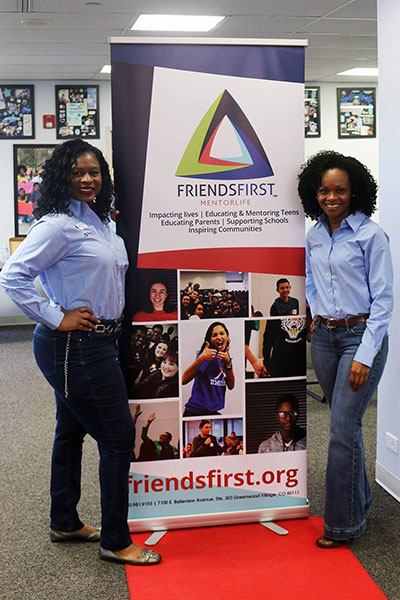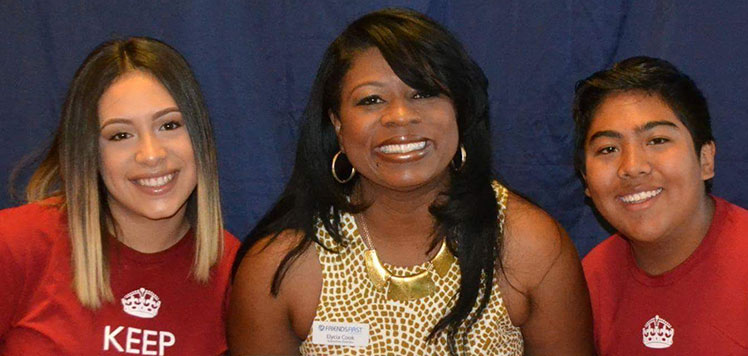This week, we spoke with Elycia Cook, executive director of FRIENDS FIRST, an organization she has led and has been a part of for nine years. Elycia is an inspiration to us for her incredible motivation to make a difference through mentoring—one child at a time.
1. Tell us about you and your organization and the social change you are trying to achieve.
“At FRIENDS FIRST, we educate and mentor teens to make positive life choices and to develop healthy relationships. Our signature program is called STARS, which stands for students teaching about relationships and success. This involves peer mentoring, adult staff mentors and high school students, who together mentor middle school students using original STARS curriculum. We teach self-awareness—understanding their personalities, strengths, weaknesses, and that every decision they make today has some impact on their life.
“A main concept of being a mentor is always having someone investing in you and paying it forward by you investing in others. Right now, we are facing a mentoring crisis in our community, with one in three children in need of mentoring going unserved. It’s because many people think of mentoring as adult to child, like in the Big Brothers Big Sisters model. But that greatly limits the capacity of those programs. The social change we’re trying to make is to shift people from a deficit-view to an asset-based view and realize that high schoolers can help younger children with their troubles, that high school age youth are assets to younger kids. We want people to see that anybody can be a mentor, and we want people to think of younger people as potential mentors and as a great resource for solving the mentoring crisis. Instead of framing the issue of ‘at-risk neighborhoods,’ shift and see ‘at-opportunity kids,’ and think ‘how can I lift them up?’ If you make youth feel like their lives have value and that their experiences have value, they usually rise to the occasion. Younger kids like it better too because their mentors are closer in age. We need to look at our young people as assets instead of liabilities, and think of using them to change to change the world.”
2. What keeps you inspired and going when things get tough?
“I came from a very challenging background. I grew up in poverty and with verbal, physical, emotional and sexual abuse. In every way, my life was meant to be a statistic. But from a very young age, I always believed my life had a purpose and that all these things happened in my life for a reason; that I’m not a victim, this is just my testimony. Also, I had mentors and people who invested in and believed in me. I believe as adult mentors that we are meant to build a legacy and leave a legacy of mentoring. At FRIENDS FIRST, we work with kids who go through so much. Now I’m in a heavily administrative role, but when I get to go out about once a month and get out in the field working with kids, that is what keeps me going.”
3. What advice would you give to someone who is trying to break new ground in a traditional field?
“First: you have to believe in what you do. Second, you have to be able to tell your story. I will do a workshop in St. Louis called, “Shout it from the rooftops: Tell it well and tell it often” in June. To me, ‘tell it well’ is be passionate. My kids ask ‘why do we always talk to someone in the grocery store?’ First, you never know when you’re entertaining an angel! Second, there’s the ‘tell it well’ angle: when you can get others to tell it for you, then you’re spreading it around! One strategy we’ve used in this regard, and it’s part of our PR strategy, is: We have people who have benefitted from our services or who know our work nominate us—the organization, our employees, our students, etc.—for various awards in and around the nonprofit sphere. If one of our students or volunteers wins, it’s a great victory for him or her, but then it’s someone else telling FRIENDS FIRST’s story. One of our volunteers this year was a 9News volunteer of the year; it allowed us and 9News to tell our story, therefore giving us more credibility.”
 4. What book do you recommend to everyone you meet and why? OR What book is on your to-read list and why?
4. What book do you recommend to everyone you meet and why? OR What book is on your to-read list and why?
“Crucial Conversations is a book I recommend. In the world of social media and in general, a lot of people operate passively aggressively, and we tend not to confront things in a healthy way. Crucial Conversations really helps you in your marriage, as a parent, in your workplace, etc., just to navigate difficult scenarios and not hide behind gossip.
“Also, I love Between the World and Me by Ta-Nehisi Coates. I love it because I think people are not born with the same opportunities and chances in life, despite the myths we may hold about America. Especially if we’re trying to produce social change or social justice or social advocacy, we have to understand that people of color or people who live in poverty, they don’t want things for free—they just want to make the playing ground as even as possible. Some people would want to push the responsibility onto parents, but a child cannot help if it was born into a certain situation. It is on us as a society to acknowledge the inequalities that exist in accessing resources.”
5. How have you worked with JVA, and how has that helped your organization?
“I did the Executive Director Academy (EDA) with JVA. I started in my organization in 2008; after a sudden departure of a previous executive director, I was asked to serve as interim ED and then interviewed for full-time position. I had never been at that level of leadership before. I think some people didn’t believe I could do it, but the EDA gave me the confidence. It showed me many EDs are in the same boat in terms of trying to find their way. Since then, we have maintained an ongoing relationship. JVA has done some grantwriting for us. Out of the blue, one of JVA’s staff found a grant opportunity that would be a good fit for us and gave us a call about the opportunity. We applied for that grant and we got it, and that has turned into an ongoing funder relationship and with a governmental entity. Recently, Janine wrote a stellar recommendation letter in support of our application for grant money to support hiring a development director and why she thought we were ready for one, and we secured the grant; the grantmakers commented that they really appreciated Janine’s letter. Ours has been a positive, beneficial relationship in many ways that I hope will last for years to come.”
5. What else would you want to share with us that we haven’t asked?
“We are heavily federally funded—with so much going on in the presidential administration, no one can be sure what’s happening, but with FRIENDS FIRST, we are branching into an earned-income social enterprise model by selling and licensing our STARS peer-to-peer mentoring program. We are one of only four peer-to-peer mentoring nonprofits in the country that uses proven practices for peer mentoring. Many are beginning to see this as a method for solving the shortage of mentors. We offer an affordable solution that allows schools to use our curriculum and support these programs from within, independent of federal funding. I want to encourage private funders, investors and people who support teens and mentors to really rally behind not just FRIENDS FIRST but all of our community nonprofits in this uncertain time. We need you now more than ever. It’s a very scary place to be. Nonprofits do such crucial work. We need their work and we need businesses to consider how to be more generous, more kind and humane. Nonprofits have a big heart—businesses can learn from us, too. It goes in both ways.”







Leave A Comment